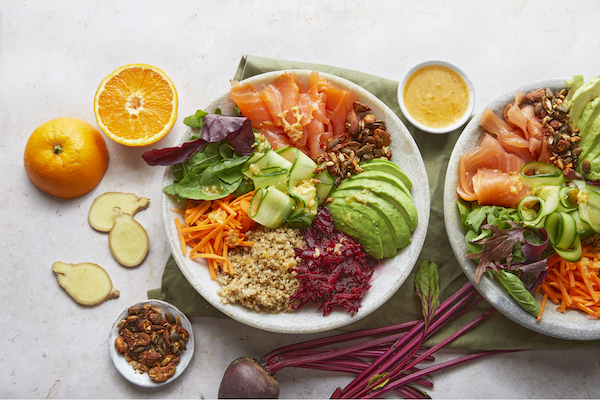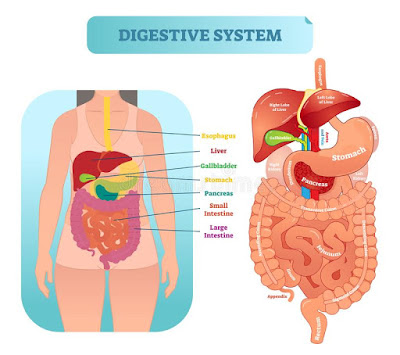Gut health | Mindful Chef

A healthy gut is a happy gut. And increasing research now links a healthy gut to more than just good digestion. Think: immunity, metabolism and even mental health. But how should we be looking after our guts? And what info should we believe when there’s so much out there?
We turn to our new Mindful Chef Dietitian, Clare, who’s going to be delving into the topic of gut health this month. Clare is a professional chef who loves food and has over 15 years of experience as a registered dietician. Clare takes a holistic approach to health and nutrition and will be sharing her most important, evidence-based tips below on how to nourish and nurture your gut health.
To round off the month, we’ve crafted a range of six gut-healthy recipes on the menu from October 31st-November 6th. We can’t promise they’ll have you dancing around the living room with joy, but each recipe contains ingredients which can contribute to good gut health. Plus high calcium which contributes to the normal function of digestive enzymes. Stay tuned.
First off, what’s the gut?
When thinking about gut health, we must consider the whole digestive system, which starts in the mouth. And goes onto the oesophagus, stomach, small intestine and large intestine, before you know what.

And what’s bacteria got to do with it?
We each have a complex ecosystem of microbes (bacteria, fungi and viruses) living in our large intestines. AKA the Gut Microbiome. It’s estimated that there are trillions of bacteria lining our large intestines – although the number and variety can vary hugely between each and every one of us.
Why does bacteria matter?
Scientists don’t believe there is one perfect pattern of gut microbes to optimise our wellbeing. But it’s thought that the more diverse, the better. As different varieties of microbes do different jobs, in different ways. Less microbial diversity in the gut has also been linked to some diseases, but it’s still not clear if this is a result of disease or a cause.
Gut health and mental health
Research indicates that there’s a two-way relationship between our gut microbiota and our brains. Simply put, not only does our brain communicate with our gut, it’s thought that gut microbes also send signals to the brain. Known as the gut-brain axis. Scientists are investigating how our diet impacts the messages being sent between the gut and the brain but it’s still early days. Findings indicate that prebiotics and probiotics may have a role in brain health and mental and emotional wellbeing – but evidence in this area is still emerging.
Gut Health and Immunity
Scientists believe that the microbes in our gut effectively train our immune system to defend itself against disease. It’s thought that lack of exposure to diverse microbes in our environment (particularly in childhood) leads to less diverse microbes in the gut and that this suppresses the natural development of the immune system – potentially making us more susceptible to allergy and autoimmune diseases.
Gut Health, Metabolism and Appetite
The gut-brain axis – the two-way communication between our gut microbes and brain – has also been linked to our metabolism (the way we process our nutrients) and appetite regulation.
Each type of bacteria in the gut feeds on specific nutrients and produces various substances, including nutrients, hormones and chemical messengers that may influence how we process energy and nutrients and our regulatory systems around feeling hungry and full. There’s ongoing and interesting research into the impact of the gut microbiome in conditions where appetite is poorly regulated, such as obesity, other metabolic diseases and eating disorders.
Gut-busting facts: True or False
So if good gut health is all about having a diverse range of microbes living in our guts, what can we do to balance our gut microbiota
1. Include probiotics and prebiotics? Maybe
What’s a prebiotic?
Prebiotics are foods that feed good gut bacteria. They’re mostly a form of dietary fibre, found in the foods we eat. Think fennel, leek, onions, garlic, almonds, silken tofu, watermelon and so much more.
What’s a probiotic?
Probiotics are microbes that are good for your gut. They need to be viable (alive), in large numbers and should be able to reach the large intestines (i.e. not get broken down on their way!). Supplementing with probiotics may help to improve the balance and function of bacteria in your gut. This balance can be knocked off by medication (like antibiotics), sickness and diarrhea, gut surgery, ageing and illnesses like IBS and IBD.
Research is ongoing. And at the moment scientific evidence has only shown probiotics to help; the treatment of gut disorders such as IBS; travellers diarrhoea and when taking antibiotics (and for one week after).
On top of this, the strains and numbers of bacteria found in different probiotic products varies massively. And it’s isn’t a one size fits all approach. There are no standard probiotics to support all conditions and symptoms. So, always seek advice from a doctor or dietitian.
2. Eat fermented foods? Maybe
Fermented foods like kimchi, miso, kombucha, sauerkraut and kefir have stepped into the spotlight as the latest food trend to promote good gut health. We’ve been fermenting food for thousands of years as a way to preserve them. They add interesting flavours and textures to your meals but the science around whether or not they benefit your gut health is limited.
With fermented foods there’s not enough reliable info about the strains or quantities of beneficial microbes present in them. Many forms of good bacteria are anaerobic, in other words they need to be in an environment with no oxygen to survive. Once they’re exposed to oxygen, fo example once you’ve opened a pot of yoghurt or a bottle of kombucha, the amount of bacteria starts to decrease.
On top of this there’s no evidence to show if the bacteria found in fermented foods is able to make it through to the gastrointestinal tract. The stomach is very acidic and so few microbes are able to make it through. Probiotics used clinically tend to be coated to protect the and allow the bacteria to travel to the large intestines unaffected. While fermented foods can be enjoyed and help with a varied, balanced diet, they’re not probiotics there isn’t enough evidence to support eating them to improve gut health.
3. Try colonic irrigation? False
Colonic irrigation is a popular trend in the wellness industry though to remove toxins and improve gut health. But when researchers have reviewed the scientific evidence around colon cleansing, not only are there no benefits, they’re actually found a number of report of negative side effects and serious complications like septicaemia and electrolyte imbalances. Bowel perforation is also a risk factor. And it has the potential to remove beneficial microbes from the large intestines, lowering the quality and diversity of microbes in the gut.
4. Try apple cider vinegar? False
A quick google search of apple cider vinegar (ACV) shows a huge list of health and nutrition claims, including improved digestive health. It’s claimed that ACV contains food microbes and aids digestion by increasing the acidic environment in our stomach. There’s no scientific evidence to support these claims. In fact the hydrochloric acid in our stomachs is much stronger than ACV. And the quantities of good bacteria in ACV is minimal compared to probiotics and fermented foods.
5. Eat a diverse diet, high in fibre and avoid restrictive diets – True
Good gut health is all about having a diverse range of bacteria as part of our gut microbiome (all the bacteria, fungi and viruses living in your large intestines). Research shows that a diet high in fibre is very important for this. Why? Because fibre isn’t broken down by enzymes in our digestive system. It gets all the way to our intestine whole, where it feeds the microbes in our gut, encouraging diversity and growth. Fibre comes from plants. So eating a wide range of vegetables, fruits, legumes and wholegrains is a great place to start. A study by the American Gut Project found that people who ate 30 different plant foods on a regular basis had more diverse gut bacteria than those who ate 10 or fewer. So why not try counting up the number of different plant foods you eat each week, aiming for 30? Your Mindful Chef recipes are always bursting with a range of vibrant ingredients (and plenty of fibre).
6. Practice good oral hygiene – True
Our mouths are the start of our digestive system. So taking care of our teeth plays a role in our gut health. Some studies have shown that bacteria in the mouth, associated with poor health can translate to the gut. This alters the makeup of the gut microflora, potentially impacting other body systems. It’s recommended we brush out teeth twice a day, floss and go for dental check ups on a regular basis.
7. Eat Foods Rich in Phytochemicals – True
Phytochemicals are a group of beneficial chemicals that come from plants. Polyphenols are a type of phytochemical that’ve been associated with preventing many cancers and heart disease. They mostly can’t be absorbed in the small intestine. But in the large intestine they’re broken down by the gut microbiome and changed into an absorbable form. Sources of polyphenols include cocoa, extra virgin olive oil, flaxseeds, pecan, almonds, red wine, blueberry, blackcurrant, plum, cherry, raspberry, prunes, chicory, red onions, black beans, broccoli, asparagus, red onion, olives.
8. Stress Management – True
Stress (and the hormonal responses to it) can impact many aspects of your wellbeing. And gut health is no exception. Your gut is physically connected to your brain by millions of nerves and neurons. So it’s a no-brainer that digestive issues like bloating, constipation and loss of appetite are widely linked with stress. Research indicates that there’s a two-way relationship between our gut microbiota and our brains. Simply put, not only does our brain communicate with our gut, it’s thought that gut microbes also send signals to the brain. Known as the gut-brain axis. Scientists are investigating how our diet impacts the messages being sent between the gut and the brain but it’s still early days. So what lifestyle changes can we make to reduce stress and in turn help our guts? Our in-house dietician Clare recommends 3 simple tips…
- Mindful Eating – eat your food slowly and make sure you chew it well, to help avoid digestive issues – after all, your stomach doesn’t have teeth! Focus on flavours, textures and overall experience of your meals to help you tune into hunger signals and enjoy your food.
- Avoid tech at the table – having a calm eating environment and avoiding distractions like our phones, laptops and work will support mindful eating.
- Stress management – activities like yoga, meditation and even cognitive behavioural therapy (CBT) can also be used to improve gut health.
9. Get advice and support – True
As mentioned, our microbiomes vary massively in terms of numbers and diversity between individuals. And gut issues are highly individualised. If you have any gut health concerns, get advice from a trained professional, see your doctor or a registered dietician for support and advice that’s tailored to your needs.
—————
TRANSCOM ISP – Free Sigma HSE Email
Level 6 Domain Names are FREE – Register Now.
